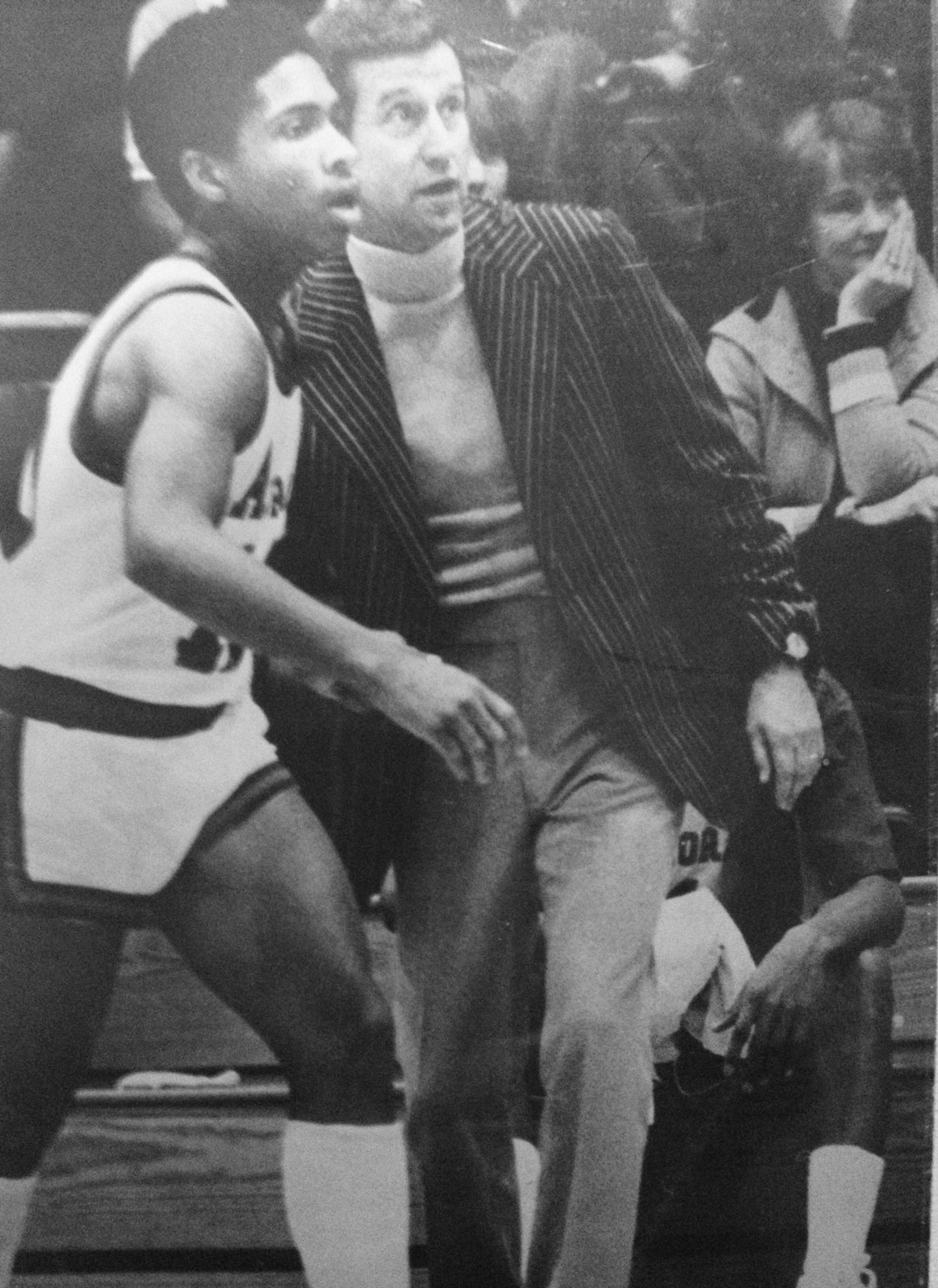
Don Holler: The Death of a Coach
It’s hard telling when the cascading medical problems began. Let’s just say that life in Don Holler’s eighties was not kind. Procedures, infections, surgeries, medications, nursing homes, hospitals, Alzheimer’s, and maybe even Parkinson’s eventually killed him. I have wondered if being in terrific physical condition heading into his eighties prolonged his agony. He died at the age of 88, same as his father.
The final time I visited Dad was December 31st, 2023. He was in a hospital bed but at home. He had required around the clock care for over a year ($8000 a month). Dad could no longer get up and could no longer feed himself. He said only two words on that day, “Hi Tony”. In a scene I will never forget, Mom spoon fed him “thickened” water so he would not choke.
My parents had moved from Oswego to McHenry in March of 2022 to a place without stairs and to be closer to my sister Nancy and her husband, Mike. Nancy and Mike went above and beyond in their support of Mom and Dad. I am left with the guilt of not going above and beyond.
Instead of being 15 minutes from me, my parents were now a 90-minute drive. On the way to visit and the way home, I played music from my iPhone through my car’s stereo. It was just me and my music. On the way home from McHenry on New Years Eve, a song from The SteelDrivers randomly played (Chris Stapleton was the SteelDrivers original lead singer.) In the song, this verse painted a picture of what I hoped for Dad.
I will make my way across the fields of cotton
And wade through muddy waters one last time
And in my dreams I come out clean
When I reach the other side
West of where the sun sets, where rainbows never die
Don Holler “reached the other side” on my parents’ 66th Wedding Anniversary four days after I had visited. I got the call from Mom at 4:06 AM. I tried to go back to sleep but my brain had other ideas. It’s had a mind of its own since 4:06 on January 4th, 2024.
I delivered the Eulogy for my mother-in-law around 30 years ago. Shirley Brinkley had been bedridden and had suffered terribly from M.S. for 20 years. I reached into my music catalog then too. “It’s been a long time coming. It’s going to be a long time gone.” (David Crosby)
Like my dad’s death, Shirley’s death was a blessing. But, even at best, death is hard on the survivors.
Mythology
Death often makes mythological figures out of ordinary humans. I understand why our brains choose to do this.
My dad was an ordinary human from humble beginnings. His poor, uneducated parents did the best they could to raise five kids during the depression. Dad was a storyteller and he told me hundreds of stories of literally fighting his way through childhood. Though he was an unsupervised, if not unwanted child, he seemed to forgive his parents and always described them in glowing terms. Dad always found a way to say good things about people.
Don Holler had his faults and many of them could be traced back to his hardscrabble upbringing.
I was never the fighter dad wanted me to be. I was only involved in a couple fights growing up and I never won one. Realizing that I was long, thin, and slow, dad would remind me that “the winner of a fight was often the guy who was willing to pick up a ball bat”.
From the earliest age, I realized that nothing got Dad more excited than a bench clearing brawl. His instructions to me, “Always be the first guy off the bench.” Yep, he wanted me to be a fighter. More importantly, he wanted me to be a great teammate.
It’s no surprise that Don Holler’s fighter mentality had its downside. As a golfer, Dad was volatile. He would throw a club when unhappy with a shot, even if he was playing alone. As a young coach, he was a poor loser and was proud of it. I know of at least one locker room door that was permanently damaged when he kicked it. In a faculty basketball game where grown men were just having fun, Dad dropped 42 points at age-38 and nearly got into a fight. Once, playing Hearts with the family, we laughed when dad got stuck with the queen, and he quit. He didn’t like to lose and hated being laughed at. 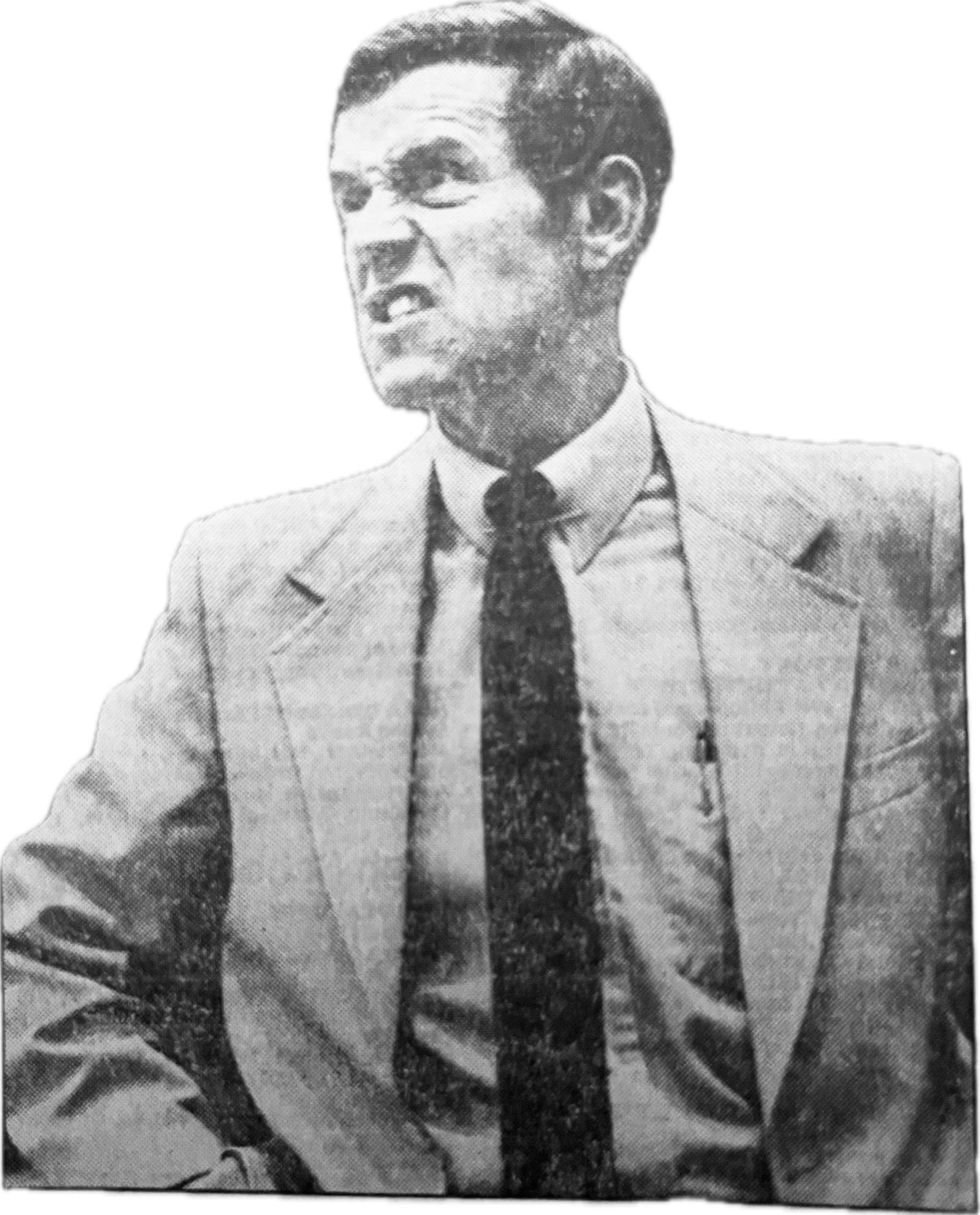
Without question, being the most competitive person I’ve ever known also had its upside. Being a poor loser fueled his competitive fire and made the challenge of coaching something that stirred his blood. Finding something that stirs your blood is a life hack.
I’ve often said that teams reflect their coach (and later in my career I’ve learned that coaches reflect their teams). Dad’s intensity became his team’s intensity. Don Holler’s consistent energy rubbed off on his athletes. His ferocious charisma created a captive audience that hung on every word he ever said.
Get Up
Failing as a fighter, I passed other tests of toughness. Besides winning fights, the other side of “toughness” for Dad was the ability to GET UP when you’ve been knocked down. Dad loved the scene in “Cool Hand Luke” when George Kennedy beat the hell out of Paul Newman. Paul Newman (Luke) kept getting up. George Kennedy after knocking Paul Newman down about a hundred times, said, “Stay down, you’re beat.” Newman’s response, “You’re going to have to kill me.”
Dad’s constant message of “GET UP” served me well as an athlete who had dozens of ankle sprains, three broken bones, ten shoulder dislocations, and three surgeries. I played football for Dad one year. He was sophomore football coach at Princeton H.S. and I was his quarterback as a freshman. I injured my ankle in a Wednesday practice. All dad said was “GET UP.” (He hated when athletes laid on the ground injured.) After practice, I removed my cleats and my socks, limped to the coaches office, and knocked three times. Dad answered. I said nothing and pointed at my softball-sized ankle. His response, “Good Lord, why didn’t you say something?” Two days later, I played every play with almost two rolls of tape on my ankle.
Two years later, on a 3rd and 9 in the first quarter of a game against Plainfield High School, I scrambled for a five yard gain but I took a hit that destroyed my shoulder. I never played football again. Anyone who’s ever taken a devastating hit understands that time stands still and everything goes quiet. But, I heard a voice say, “GET UP”. I walked off the field with my right arm much longer than my left. The last time I wore a football jersey, it was cut off of me. An ambulance drove me to Copley Hospital where it was reset by an orthopedic surgeon at midnight. Dad was proud of me.
Evolution
Dad’s competitive fire made him a great young coach. The ability to evolve allowed him to continue to coach for almost 50 years.
In the late sixties, the “Woodstock Generation” collided with the “Haggard Generation.” Being a huge fan of Merle Haggard, Dad saw himself as a hard working, salt of the earth, patriotic, family man… in opposition to the lazy, America-hating, drug-addicted, peace-loving hippies. It was a hard time for both groups. Once dad literally cut the sideburns of a player before a basketball game. Long hair, sideburns, and beards might work for Neil Young, but not basketball teams. Then Don Holler evolved.
I will never forget Dad yelling at the TV when Tommy Smith and John Carlos chose to protest white supremacy on the awards stand in the 1968 Mexico City Olympics. To the WWII generation, this protest was anti-American. Dad agreed when Smith and Carlos were suspended and banned from the Olympic Village. Dad also agreed when Mohammed Ali was stripped of his Heavyweight Title for resisting the draft as a conscientious objector. Then Don Holler evolved. Unlike typical Americans who get everything figured out in their twenties and then spend the rest of their life defending their views, my Dad changed over time and it served him well.
I was recently asked, “What did you learn from him the most?” My reply, “Dad loved being part of a team. He was consistently excited about the next practice, next game, or the next season. I’m the same way.” I call this “inertia”… moving at a constant rate at speed in a consistent direction.
Money
Another holdover from my father’s childhood was his strange relationship with money. Living without money as a kid continued throughout his entire life. He never carried a wallet, never cashed a check, never paid a bill, and never slipped me a five. Ever.
Once Dad came home on a Friday and told Mom, “We need four new tires.” Mom replied something like “Do you think money grows on trees?” The rest of the night, Dad got the silent treatment. The next morning, I went with Dad to a basketball camp where he was a guest speaker. He was presented with a $25 check. Don Holler handed the check back to the coach and said something like, “Pay it forward”. When we got into the car, I asked, “Don’t we need new tires?”
Gay Kintner
Inertia is all about moving in a straight line at a constant speed unless acted upon by an outside force. Don Holler’s outside force was his legendary basketball coach, Gay Kintner.
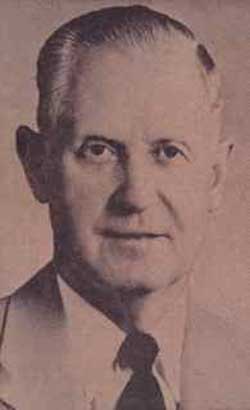
Gay Kintner was born in 1895 and was a World War I veteran. He won three state championships, 649 games, and died on the bench while coaching against Decatur Eisenhower at the age of 64, three days before my first birthday. I am now the age of Gay Kintner when he died.
Gay Kintner had two gyms named after him (Kintner Gym, and Kintner Gym II). The “Running Reds” of Stephen Decatur played in a bigger gymnasium than Huff Gym where University of Illinois played. Every game was a sell out. Gay Kintner was bigger than life. On the night he was wheeled to an ambulance, a woman said, “There goes the best man this town has ever seen.”
In 1950, Gay Kintner met a skinny freshman named Don Holler. Kintner gave the kid a basketball and said in his machine gun voice, “Holler, wear this thing out, you are going to be one of my great ones.” There are watershed moments in life that change everything that comes after that moment. For Don Holler, everything changed that day, 74 years ago.
The other life-changing interaction between Gay Kintner and Don Holler came in dad’s senior year. In the 1950s only 7% of high school students went to college. Don Holler did not consider himself college material. His parents didn’t even attend high school. Gay Kintner saw to it that Don Holler went to college. As a senior at Millikin University, dad met Paula Kane, a high school Valedictorian from Carmi, IL. Their marriage lasted 66 years.
I often say my favorite word in the English language is ENCOURAGE, which simply means “to give courage”. Gay Kintner gave courage to Don Holler. Don Holler paid it forward.
Dad told me dozens of times that he wanted to “die on the bench, like his coach”. As a kid, this seemed strange to me. As an old man, this makes sense.
I can’t imagine Dad learning of his coach’s death February 15th, 1960. Gay Kintner may have been buried on my first birthday three days after his death. Even though I had never met the man, I’ve always thought that Dad was a bridge from his old coach to me. Maybe I’m now a bridge.
Don’t Bet Against Don Holler
Brad Hulke played for Dad at Aurora Central almost 30 years ago. He also played football for my Mom’s brother, Kelly Kane, at Monmouth College. My mom is even a part of this story. Mom and Dad drove to Beloit to see Brad Hulke play. Mom brought Brad cookies, something he has never forgotten.
Last year, Brad reached out to me when his daughter, Clair Hulke, scored her 1000th point as a junior playing for Rock Island Alleman. Claire shoots 80% from the free throw line because Brad Hulke taught her to shoot free throws the way Don Holler had taught him.
Dad was 53 when he coached Brad as a senior back in 1998. Brad Hulke had never seen Don Holler shoot a basketball (Dad had not played basketball for 15 years). Brad bet Dad that he couldn’t make seven out of ten free throws. Dad missed the first and the 25th, making 48 out of 50 free throws. Dad explained to Brad that he spent long hours in the gym as a kid because he had a tough home life. Lesson learned: Don’t ever bet against Don Holler.
70 Year Old Memories
On a visit several months ago, I went through a box of memorabilia. Dad was still walking with a walker and feeding himself at the time but couldn’t work a remote control or tie a shoe. He would often start a sentence and not be able to finish.
I found this picture and asked him if he remembered it.
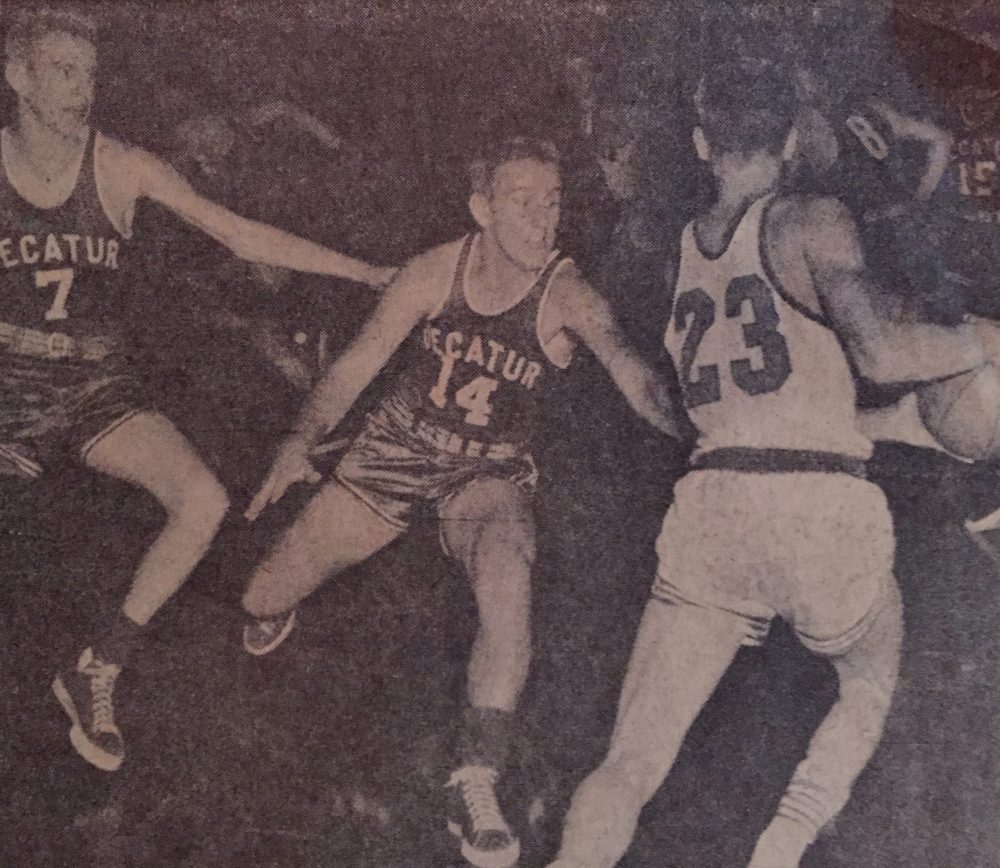
In broken sentences, Dad said, “I was a sophomore, the first game I started varsity. We were playing East St. Louis at Kiel Auditorium. East St. Louis was all white back then. I scored 16.”
This is a feature of Alzheimer’s… loss of short term memory but many long term memories survive. Regardless, to hear dad come alive was a moment I will never forget.
And there are no memories like sports memories.
A picture’s worth a thousand words
But you can’t see what those shades of gray keep covered
You should’ve seen it in color
~Jamie Johnson
Teacher
Don Holler wasn’t only a coach. On November 22, 1963, he informed his history class at Flanagan High School that John F. Kennedy had been shot.
Dad was a history teacher at Princeton High School. As a freshman, I took his semester course, “World War II”. It was my favorite class. I had many upperclassmen tell me that dad had been their favorite teacher.
Spooky Action at a Distance
Einstein’s “Spooky Action at a Distance” is also known as “Quantum Entanglement”. If you observe a particle in one place, another particle, even light-years away, will instantly change its properties, as if the two are connected by a mysterious communication channel. Dad and I seemed to have a weird connection like this. I believe we felt each other’s joy, and each other’s pain. I’ve heard that twins sometimes experience this.
This connection between dad and I did not serve us well in our coach-player relationship. I cared too much. I wanted to win for dad. I wasn’t just a typical teenage basketball player who wanted to make shots and win the game, my play was attached to the success of my dad. I often say that the two counterintuitive enemies of performance are 1) thinking too much, and 2) trying too hard. I suffered from both. I’m pretty sure that Dad suffered my pain as well. I was injury-plagued and I can only imagine the toll that took on him. I never asked him about it because I knew it to be true.
Dad cried a lot when Alzheimers took over his life. In the rest of his life, I can only remember him crying once. In March of 1990, I got fired as basketball coach at Harrisburg High School. I called him before school the next day. He had to hand the phone to Mom because he was too choked up to talk. He probably was reminded of my tears when he told me that he had been fired in 1973, and again in 1978. I wrote him a letter after he got fired at Oswego in 1978, encouraging him to never give up. He coached another 26 years. After my dismissal in 1990, he sent me a copy of my letter that he had kept in his top drawer since 1978. I’ve coached 34 years since I was fired as basketball coach at Harrisburg High School.
I see dad in the mirror every time I shave. I see the back of his left hand whenever I look at mine. There’s never a day in my coaching that something doesn’t come out of my mouth that sounds just like him.
In the great paradox of life, the only thing we take with us when we die is everything we gave away when we lived.
Rest in Peace Dad.
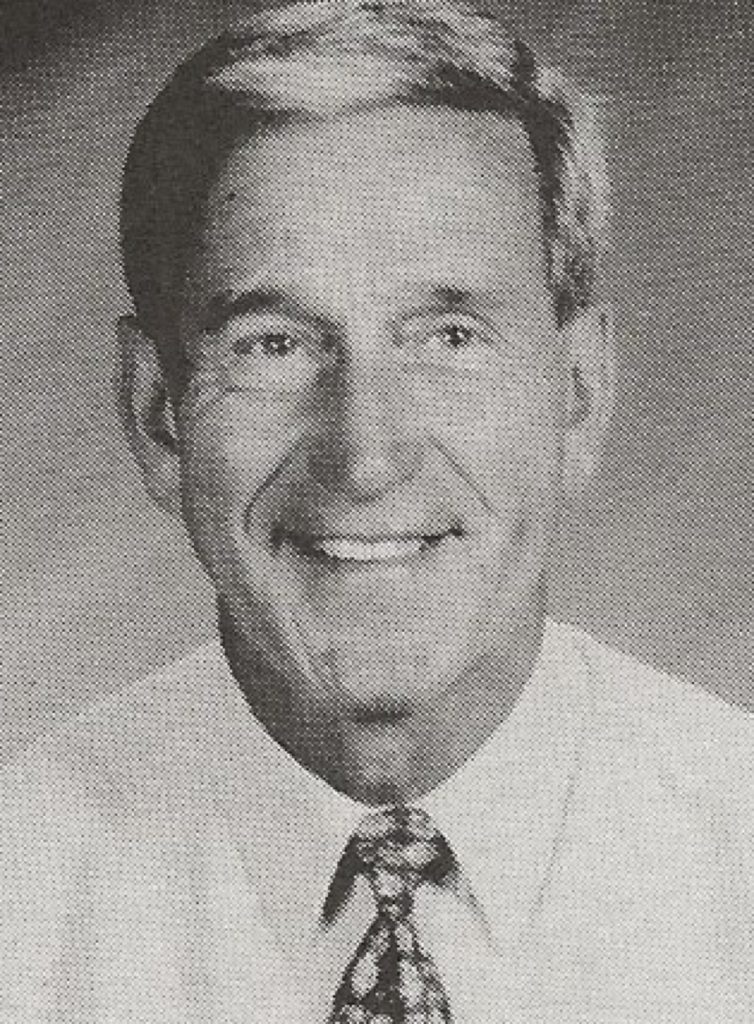

Wow. What a tremendous testimony for your dad, Tony. You must have learned how to write after you graduated from Oswego! LOL! By the way, I remember your dad was always proud of you. He may have been careful not to get carried away because as coach he had to be. But his pride would shine through.
This is amazing. Feeling for you and your family Coach Holler. Clear he was the driving force behind all of it.
A worthy tribute. There’s greatness in us all. Thank for sharing this wonderful story.
Amazing tribute to your Dad and so well written, an amazing life.
Beautiful. Thanks for sharing, Coach.
As the oldest daughter of a high school football coach I relate to much of your story and enjoyed reading about you and your beloved father. Condolences to your family
Your life experience with Don is much like mine, Tony. I remember you well. Uncle Ron
And I remember you my friend.